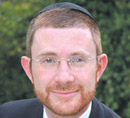It’s time for a Simchat Torah without alcohol
IT’S the time of year when hardware stores entertain a whole new clientele. Religious Jews exchange spirituality for spirit levels; pages of Talmud for planks of wood. Succot is here.
Building a succah is not only a wonderful family experience; successive years of construction can serve to monitor and record a family’s development.
Many years ago, our toddlers sat in little chairs watching in awe as I sawed and hammered.
Now, I sit in a chair nursing my sore back while my wife and teenage children complete the task.
Some manage to avoid the carpentry altogether by using the latest canvas succah erected over a metal frame, though the wind and rain that count for spring in Melbourne are often a match for such a tent-like structure.
Nevertheless, moving one’s family and guests out into the garden for meals, protected from the elements by little more than some foliage or bamboo poles, is a special and delightful occasion whatever the weather.
Succot is the culmination of this busy festival-filled season, and the climax of Succot itself is Simchat Torah — “the joy of the Torah”.
This is the day on which we conclude the annual cycle of weekly Torah readings, and immediately start again from the beginning -— going from the end of Deuteronomy right back to the start of Genesis.
Within this simultaneous achievement of completion and renewal lies the simcha, and the event is observed with lengthy singing and dancing.
But in some circles, another source for joy emerges on this day, which threatens to turn a day of celebration into a serious communal hazard.
I was once told that when a group of young Jews was asked to explain the practices of Simchat Torah, the only thing that they could recall was: “It’s the day when the religious Jews get drunk.”
Indeed, some have the impression that Simchat Torah and Purim are days when Jews are not only allowed, but actually encouraged, to drink to the point of inebriation. Tragically, this impression is shared by some religious Jews who attempt to fulfil this “obligation” and also by others, who look in disgust at what they perceive to be a religion that encourages such behaviour.
In fact, even if there is permission to drink to excess on Purim, under some very limited circumstances (only by day and not the night before, and only if one can ensure that one’s behaviour remains at all times for the sake of heaven -— something that very few can guarantee), there is no such licence on Simchat Torah.
The prohibition against drunkenness remains in force on that day, as it does on every day of the year, except (possibly) Purim.
For some time, an accepting attitude to drinking on Simchat Torah has been prevalent. A l’chaim or two was considered one of the customs of the day, and “traditional Jewish practice” was used to excuse, or even ¬≠promote, free-flowing alcohol.
But such a permissive outlook is no longer acceptable. It is time to be cognisant of the damage that this so-called “traditional Jewish practice” is causing.
In an age when teenage binge drinking is of increasing concern in the wider community and among our own youngsters, including alcohol in the celebration of Simchat Torah creates a problem on at least two levels.
The first is the example that adults set. Drinking on Simchat Torah may be designed to allow alcohol to enhance the atmosphere, but observers could mistakenly assume that the atmosphere could not be created without the drinks.
Is it not possible to teach a better lesson -— that we can have fun without artificial stimulants? That life itself, especially on days of joy, contains enough excitement and pleasure to be enjoyed without using alcohol to heighten the mood.
This negative message can have harmful effects that may only become apparent at a later stage. But a more immediate consequence could result from the practice in some synagogues for the spirit — in both senses -— to be shared with all participants, including teenagers.
Not only is this illegal in New South Wales (and a campaign is growing to create the same law in Victoria), it reinforces the drinking culture that is plaguing our ­youngsters.
Even worse in some cases, a teenager’s first introduction to drinking occurs in shul.
How can we then convey the message of the dangers of alcohol abuse when it comes from such a “kosher” and legitimate source?
Thankfully, there is a growing awareness of the extent, and the dangers, of alcohol abuse and binge drinking among young people in our community. But awareness, and even education, is not enough.
We need to set an example of alcohol-free enjoyment. Let’s make next Sunday a Simchat Torah, the simcha of the Torah, without the need for the simcha of anything else.
Rabbi James Kennard is principal of Mount Scopus Memorial College, Melbourne.


comments